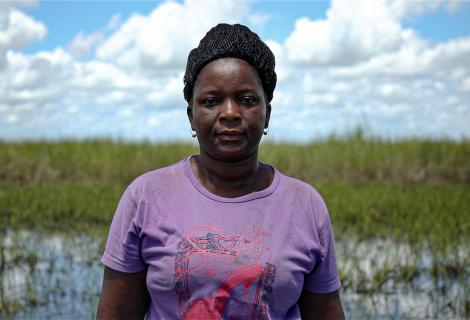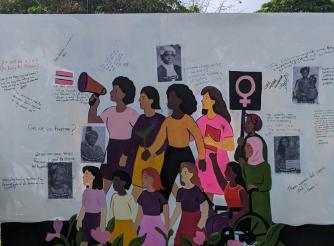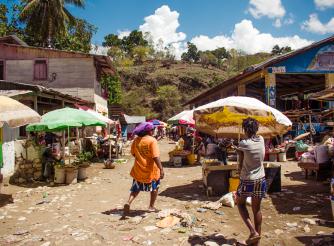Are NGOs willing to share power and resources with local women’s groups in the battle to eliminate violence against women?

By Julia Sánchez, Secretary General, ActionAid International
Nearly three decades ago, governments signed the Declaration on the Elimination of Violence Against Women. Since then, laws on domestic violence have been passed in 155 countries and 140 have outlawed sexual harassment in the workplace. But the truth is that, despite substantial progress in raising awareness, today’s world is no safer for women. In fact, the scale of the problem has reached epidemic proportions – globally, one in three women will be raped, beaten, coerced into sex or otherwise abused in her lifetime.
We are sleepwalking into a shadow pandemic of global femicide. In June, ActionAid’s report, Surviving Covid-19: A Women-Led Response, warned of the disproportionate impacts that Covid-19 was having on women and a skyrocketing increase in violence. We found a shocking tenfold increase in domestic violence reported by women’s shelters supported by ActionAid. These shelters had to fight to stay open and to be recognised as essential services, while governments diverted funding to respond to the pandemic.
Our latest report, to be released next week, surveys young women in urban settlements in the global south and reveals the impact Covid-19 has had on all aspects of their lives. The majority (58%) report increased violence during lockdowns, as well as citing major difficulties earning income or continuing study, affording food and accessing public services.
Women face multiple and intersecting forms of discrimination. Lesbian and bisexual European women are almost five times as likely to have experienced physical and/or sexual violence compared to straight women. In Uganda, disabled girls are twice as likely to experience sexual violence at school, compared to their non-disabled classmates.
LGBTIQ people and women who are structurally excluded due to their race, ethnicity, class, caste, age, disability or other factors will be more severely affected by the Covid-19 pandemic, the violence it exacerbates and the squeezing of public services that follows.
Yet development programmes are rarely designed to be intersectional. By reducing a complex set of intersecting systems of oppression into bite-size single issues, we lose focus on the political (and cultural and religious) systems and practices which lead to violence.
Research and analysis should be women-led and disaggregated to deepen our understanding of violence against specific groups. LGBTIQ people, sex workers, women living in poverty or with HIV and AIDS, widows, women accused of witchcraft, women in informal work, single mothers, or smallholder women farmers are affected by the pandemic in distinct and profound ways because of the intersecting forms of discrimination they face. In order to plan appropriately to address these diverse realities, we must first have access to disaggregated data, which unfortunately is rarely available. And then we must document the lived experience of those on the ground and in the frontlines. ActionAid’s own feminist research is participatory, shifting power to the women being surveyed.
Only by taking a human-rights based approach and planning holistic support systems for young women’s multiple experiences, can we effect real and lasting change. To support women’s economic empowerment, we can offer skills-training and credit, savings and employment initiatives. We can encourage girls to complete their secondary education and empower girls to choose if, when, and who to marry, and ensure their reproductive rights. All of which will help to mitigate violence.
Changing culture is the hardest challenge but is critically important to ensuring progress is sustainable. How do we stamp out harmful beliefs, about shame and piety, which lead to rapes going unreported? One step is to involve men in conversations about attitudes. Many of our women’s rights champions at a community level are village elders, religious leaders and young urban men. Only by shifting cultural norms will we succeed in eliminating violence against women.
Putting women in the driving seat during emergencies helps us to shift behaviour patterns and address deeper rooted structural and patriarchal issues. ActionAid believes that strengthening local leadership in humanitarian responses – especially by women and girls– is key to the effectiveness. Adapting a women-led approach also contributes to progress women’s rights and gender justice in the communities affected by the crisis. More than 60% of ActionAid’s humanitarian funding goes to local organisations, and the majority are women’s groups. More funding needs to go to local women's groups, to address the real needs of the community and to affect lasting change in power relations while doing that.
As a sector, donors and NGOs have committed to increasing localisation, shifting power, promoting local ownership and establishing equitable partnerships. But that is easier said than done. To offer a platform to local grassroots partners, we often need to subsume our own brand. Increasing resources to local actors can translate into decreased resources for international players in a tight zero-sum funding environment. And relinquishing power and control is often challenged by retrograde attitudes, policies and regulations that remain patriarchal and colonial.
So, are we willing to relinquish power and resources to allow communities and local women’s groups to lead? Our response to the Covid-19 crisis, and the ensuing gender-based violence pandemic, will surely help us find the answer. And hopefully one day soon we will no longer need an International Day for the Elimination of Violence Against Women.


